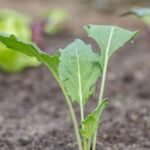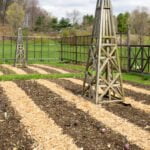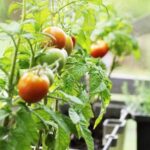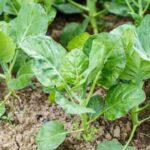When it comes to successful vegetable gardening, having the right tools at your disposal is essential. From soil preparation to seed planting, the tools needed for vegetable gardening play a crucial role in ensuring a bountiful harvest. Whether you are a seasoned gardener or just starting out, equipping yourself with the proper tools can make all the difference in your gardening experience.
One of the key aspects of vegetable gardening is maintaining the health and productivity of your plants. This requires using a variety of hand tools such as trowels, pruners, and cultivators to tend to your garden beds and plants. Quality hoe and spade are also indispensable tools for effectively preparing the soil before planting, making sure that your vegetables have the best possible environment to grow.
As you delve deeper into the world of vegetable gardening, you will discover that specialized tools for seed planting and transplanting can make these tasks much easier and more efficient. Additionally, investing in watering cans and hoses is essential for providing adequate moisture to your vegetables. By having the appropriate tools on hand, you can ensure that your vegetable garden thrives throughout the growing season.
Essential Hand Tools for Vegetable Gardening
When it comes to maintaining a successful vegetable garden, having the right hand tools is crucial for effective planting, weeding, and harvesting. Essential hand tools play a vital role in ensuring that your vegetables thrive and flourish throughout the growing season. From cultivating to pruning, these tools are indispensable for any gardener looking to cultivate their own fresh produce.
Trowel and Weeder
One of the most basic yet essential hand tools for vegetable gardening is the trowel. This small handheld tool is perfect for digging small holes for seeding or transplanting seedlings. Additionally, a good weeder is crucial for removing weeds without disturbing nearby plants or roots. Keeping a trowel and weeder handy will make planting and weeding tasks much easier and efficient.
Hand Fork and Hand Rake
A hand fork and hand rake are also important tools to have in your arsenal when it comes to vegetable gardening. These tools are perfect for breaking up soil, loosening compacted dirt, and removing debris from the garden bed. Using a hand fork and rake allows you to aerate the soil effectively, ensuring proper water drainage and root growth for your vegetables.
Garden Scissors
Garden scissors are another essential hand tool that every vegetable gardener should have. These scissors are perfect for harvesting vegetables like herbs, lettuce, or peppers without damaging the plant or surrounding foliage. With sharp garden scissors, you can easily harvest your produce at peak ripeness, promoting continuous growth throughout the season. Having these basic hand tools in your gardening toolkit will set you up for success in maintaining a thriving vegetable garden.
Quality Hoe and Spade for Soil Preparation
When it comes to soil preparation in vegetable gardening, having the right tools is crucial for success. Two essential tools that every gardener should have in their arsenal are a quality hoe and spade. These tools are designed to make soil preparation tasks easier and more efficient, helping to create the ideal growing environment for your vegetables.
A hoe is a versatile tool that can be used for a variety of tasks, including weeding, cultivating, and breaking up clumps of soil. There are different types of hoes available, such as the traditional flat hoe or the pointed hoe, each serving a specific purpose in the garden. A good quality hoe should have a sharp blade that can easily cut through soil without too much effort, making your gardening tasks less strenuous.
In addition to a hoe, a sturdy spade is essential for soil preparation in vegetable gardening. Spades are perfect for digging planting holes, turning over soil, and edging garden beds. Look for a spade with a sharp blade and a strong handle that can withstand heavy use.
When choosing a spade, consider the size and weight that you are comfortable working with to avoid straining yourself during long hours in the garden. Having these tools on hand will make soil preparation tasks quicker and more efficient, allowing you to focus on growing healthy and vibrant vegetables.
- Choose high-quality stainless steel or carbon steel tools
- Invest in ergonomically designed handles for comfort
- Regularly clean and sharpen your tools to ensure optimal performance
Must-Have Pruning Shears for Vegetable Care
Pruning shears are an essential tool for vegetable care in any garden. These handy tools are designed to trim and shape plants with precision, promoting healthy growth and overall plant health. Whether you are cutting back overgrown branches or deadheading flowers, having a reliable pair of pruning shears is crucial for maintaining your vegetable garden.
When selecting pruning shears for your vegetable gardening needs, it is important to choose a high-quality pair that fits comfortably in your hand. Look for pruning shears with sharp blades that can easily make clean cuts on plant stems without causing damage. Additionally, consider choosing pruning shears with ergonomic handles to reduce strain on your hands and wrists during use.
Using pruning shears correctly is also key to successful vegetable care. Make sure to sterilize the blades before and after each use to prevent the spread of disease between plants. When pruning vegetables, always aim to make angled cuts just above a leaf node to encourage healthy regrowth. Regularly sharpening the blades of your pruning shears will also help maintain their effectiveness in the long run.
| Pruning Shear Care Tips | Importance |
|---|---|
| Sterilize Blades | Prevents disease spread |
| Make Angled Cuts | Promotes healthy regrowth |
| Regularly Sharpen Blades | Maintains effectiveness |
Importance of Watering Cans and Hoses in Vegetable Gardening
Watering is a crucial aspect of vegetable gardening, and having the right tools for the job can make a significant difference in the health and growth of your plants. Watering cans and hoses are essential tools needed for vegetable gardening to ensure that your plants receive an adequate amount of water without damaging them.
Watering cans allow for precise watering, especially around delicate seedlings or young plants, while hoses are useful for larger areas or when you need to cover a wider range.
When choosing watering cans, opt for ones with a narrow spout that provides accurate water flow control. This is especially beneficial when watering plants that require careful irrigation, such as tomatoes or peppers.
Additionally, consider the material of the watering can – metal cans are durable but may be heavier, while plastic ones are lightweight but may not last as long. Hoses come in various lengths and materials as well, so selecting one that suits your garden size and watering needs is essential.
Proper watering is vital for the health and productivity of your vegetable garden. Overwatering can lead to root rot and other diseases, while underwatering can result in stunted growth and poor yields. By investing in quality watering cans and hoses as part of the tools needed for vegetable gardening, you can ensure that your plants receive the right amount of water at the right time, leading to a successful harvest.
| Vegetable Gardening Tool | Importance |
|---|---|
| Watering Cans | Precise watering control for delicate plants |
| Hoses | Efficient coverage for larger areas |
Specialized Tools for Seed Planting and Transplanting
When it comes to successful vegetable gardening, having the right tools for seed planting and transplanting is essential. These specialized tools can help make the process more efficient and ensure that your plants have the best chance of thriving. From seeders to dibblers, having the appropriate tools on hand can make all the difference in your vegetable garden.
Seeders and Seed Starting Trays
One of the most important tools for efficiently planting seeds in your vegetable garden is a seeder. Seeders come in various designs, from handheld models to push-style seeders that can help you plant seeds at a consistent depth and spacing. Additionally, investing in seed starting trays can also be beneficial for starting seeds indoors before transplanting them into your garden. This way, you can give your seeds a head start and increase their chances of successful growth.
Transplanting Trowels
Transplanting trowels are another essential tool for vegetable gardening, especially when moving seedlings from trays to your garden beds. These handheld tools have a sharp edge that makes it easier to dig small holes for transplants without damaging the roots. Having a high-quality transplanting trowel can help streamline the transplanting process and promote healthier growth for your vegetables.
Dibblers and Widgers
Dibblers and widgers are specialized tools that can be particularly useful for planting seeds at the correct depth or for gently transplanting delicate seedlings. A dibbler is typically a pointed tool used to create evenly spaced holes in soil for planting seeds or transplants, while a widger has a flat blade perfect for prying out seedlings from containers without causing harm.
These tools provide precision and care when dealing with fragile plants in your vegetable garden. Investing in these specialized tools can make seed planting and transplanting tasks much easier and more successful.
Protective Gear for Safety in Vegetable Gardening
When it comes to vegetable gardening, ensuring your safety should be a top priority. Investing in the right protective gear can make a huge difference in preventing injuries and discomfort while tending to your garden. Here are some essential items you should have on hand to keep yourself safe while working with your plants:
- Gloves: Proper gardening gloves are essential for protecting your hands from thorns, sharp tools, and irritants in the soil. Look for gloves that fit well and provide adequate protection without sacrificing dexterity.
- Protective eyewear: Safety glasses or goggles can shield your eyes from debris, insects, and harmful chemicals like pesticides. It’s important to keep your eyes protected while handling tools or working around plants that may release irritants.
- Sun protection: A wide-brimmed hat, sunscreen, and UV-blocking sunglasses are important tools to protect yourself from the sun’s harmful rays while spending long periods outdoors in the garden. Remember to reapply sunscreen regularly, especially on hot and sunny days.
In addition to these basic protective gear items, consider investing in knee pads or a kneeling pad to reduce strain on your joints while working close to the ground. Proper footwear with good traction is also crucial to prevent slips and falls on wet soil or uneven terrain. By prioritizing your safety with the right gear, you can enjoy gardening without unnecessary risks or accidents.
- Gloves
- Protective eyewear
- Sun protection
Technology and Modern Tools for Efficient Vegetable Gardening
As technology continues to advance, modern tools for efficient vegetable gardening have become more accessible and popular among gardeners. These tools are designed to streamline the gardening process, making tasks easier and more efficient. One such tool is the automated irrigation system, which helps maintain optimal moisture levels in the soil by watering plants at scheduled intervals. This not only saves time and effort but also ensures that plants receive the right amount of water they need for healthy growth.
Another modern tool that has transformed vegetable gardening is the soil pH tester. This handy device allows gardeners to accurately measure the acidity or alkalinity of their soil, enabling them to make informed decisions about fertilization and plant selection. By knowing the pH level of their soil, gardeners can cultivate a thriving vegetable garden by providing the best growing conditions for their plants.
In addition to automated irrigation systems and soil pH testers, there are also advanced tools like electric tillers and cultivators that can greatly simplify soil preparation and cultivation tasks. These powerful machines can break up compacted soil, mix in compost or fertilizer, and create a smooth seedbed quickly and efficiently. With the help of these modern tools, vegetable gardeners can save time and energy while achieving better results in their garden.
Maintenance and Care Tips for Vegetable Gardening Tools
In conclusion, having the proper tools needed for vegetable gardening is essential in maintaining a successful and thriving garden. Taking care of these tools is just as important as using them effectively. By following some simple maintenance and care tips, you can ensure that your gardening tools remain in top condition for years to come.
One key tip for maintaining vegetable gardening tools is to clean them regularly after each use. This helps prevent dirt and debris from building up, which can eventually cause rust or damage to the tools. Additionally, make sure to properly store your tools in a dry and safe place to avoid any unnecessary wear and tear.
Another important aspect of tool maintenance is sharpening blades and edges when necessary. Sharp tools not only make gardening tasks easier but also ensure cleaner cuts which are better for plant health. Regularly oiling moving parts can also help prolong the life of your tools. By investing time in caring for your vegetable gardening tools, you are not only extending their lifespan but also ensuring that they perform at their best when you need them most.
Frequently Asked Questions
What Tools Do You Need to Make a Vegetable Garden?
To make a vegetable garden, you will need essential tools such as a shovel, garden fork, hand trowel, watering can or hose, gloves, and a wheelbarrow for transporting materials. Additionally, items like a hoe for weeding and pruning shears for trimming plants are also helpful.
What Does Every Vegetable Gardener Need?
Every vegetable gardener needs fundamental supplies to ensure successful growth. Some key essentials include quality soil or compost, seeds or seedlings of desired vegetables, fertilizer for nourishment, stakes or trellises for support, and good-quality gardening pots or containers if gardening in limited space
What Do I Need to Buy for a Vegetable Garden?
When starting a vegetable garden from scratch, it is necessary to purchase basic supplies like soil amendments (compost, peat moss), organic fertilizers or plant food to promote growth and health of vegetables, seeds or seedlings of the vegetables you want to grow according to your climate and region.
Also investing in some form of natural pest control such as neem oil can be beneficial for tackling common garden pests in an eco-friendly way.

If you’re looking to get into vegetable gardening, or are just looking for some tips on how to make your current garden better, then you’ve come to the right place! My name is Ethel and I have been gardening for years. In this blog, I’m going to share with you some of my best tips on how to create a successful vegetable garden.





